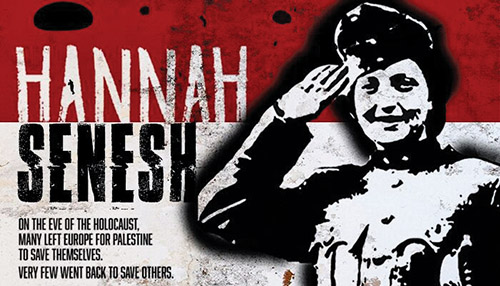
If you hurry, you can be among those who were privileged to see National Yiddish Theater Folksbiene’s (NYTF) inaugural production marking its 104th season. The NYTF production of “Hannah Senesh,” playing at its venerable venue The Museum of Jewish Heritage in Battery Park, is a winner all around. The museum, now hosting the largest collection of artifacts from Auschwitz ever collected in an exhibit entitled “Auschwitz: Not long Ago, Not Far Away,” lends a fitting and awesome background to the story of a 23-year-old Jewish martyr who died “al kiddush Hashem,” in attempting to save her Hungarian compatriots from the horrors of Nazism. From Hannah Senesh we learn about sensitivity, love of family and friends, concern for her people, a poetic and optimistic spirit and indomitable courage. She was a true heroine of our people and one to honor in every era, especially at a scary time in our history when racism and anti-Semitism are rearing their ugly heads once again. Young audiences would benefit greatly from seeing one so young and yet so committed to taking action.
Playing Hannah Senesh in the one-woman performance is Lexi Rabadi, from Albany, who was selected from over 300 who auditioned for the part. She came to the first audition having memorized half of the script. After being given the part, she began rehearsals already having committed the entire 90-minute play to memory. The rehearsals began at the beginning of July with the first performance only three weeks later on July 24.
The daughter of a Lebanese father and Irish mother, Rabadi is not from “the Tribe.” Yet, she was able to connect to the charismatic and committed Hannah so authentically that the audience takes her into their hearts from the moment the play begins. In the opening and closing acts, she appears as Hannah’s mother, recalling the story of her daughter’s growth from a romantic 13-year old to a heroic twenty-three year old. She speaks her lines with a charming Hungarian accent. In the intermediary scenes, Hannah is enacting her own story, and speaks with an American accent.
The original New York production of “Hannah Senesh,” written by David Schechter, took place 34 years ago and was performed in Yiddish. At the time, the current Associate Artistic Director of the Folksbiene, Motl Didner, was a teenager. He was so enthralled by the character of Hannah Senesh that he vowed to produce it someday- and that day is now.
The story of Hannah Senesh is well-known to Jewish schoolchildren. Senesh was a young, Jewish girl who grew up in Budapest in the late 1930s. Her father Bela was a celebrated playwright and poet who inspired Hannah’s own poetic spirit. When she found herself outside the circle of her non-Jewish Hungarian friends, she joined the newly forming Zionist youth movement. She took the daring step of moving on her own to Israel where she joined Kibbutz Sdot Yam and performed menial tasks in the raw surroundings. Soon after, she was approached by the Haganah to join a secret mission to Yugoslavia in which she would be parachuted behind enemy lines. Senesh hoped that from Yugoslavia she would be able to make her way to Budapest and help her Hungarian brethren escape. Tragically, she was caught and incarcerated in Hungary. Her mother was brought to her cell to try to convince her to reveal military secrets but she remained stoic and was eventually hanged. An unknown individual paid for her burial in the local Jewish cemetery.
In keeping with the minimalistic stage settings utilized so brilliantly in the NYTF productions, this play has no scenery other than a chair and a box with a candle atop it. Hannah’s outfits change as she grows older from a fussy party dress to an airman’s uniform. But a creative use of a cloth is used throughout the play to symbolize different significant images. In an expression of her poetic sensitivities, Senesh wishes “that the truth could be a white cloth that could be spread out for all the world to see.” Schechter gives Senesh a prop of a white cloth which she first uses to make a dress, then as a picnic blanket, then as an Israeli flag, then sand when she first gets to Palestine, then laundry at the kibbutz, then her parachute, and finally, her tortured body at the end.
For tickets to this masterful production before it closes on August 18, go to NYTF.org or call 212-213-2120.
By Pearl Markovitz













